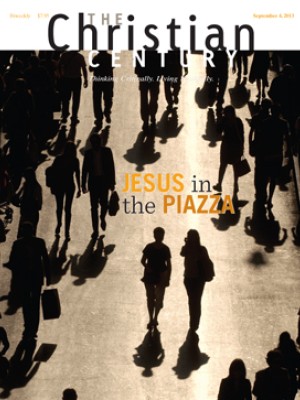A response to "Shelter in the parsonage" Case by case: Case by case

Read Ellen Blue's fictional narrative first.
Domestic violence is an open secret at Elm Street Church. Everyone, pastors and congregation alike, knows or at least suspects that Roberta is being battered by her husband, Hank. She is distraught about her marriage but can’t articulate what the problems are; she often has bruises on her body which she has difficulty explaining; she cancels appointments at the last minute. When Abigail, one of the ministers, asks her point blank if Hank is beating her, Roberta denies it but also rushes to explain that Hank is under a lot of pressure.
As Marie Fortune has taught us, religious communities can offer “roadblocks or resources” for women in situations of domestic violence. Religious notions of self-sacrifice, the sanctity of marriage and the redemptive value of suffering can all conspire to keep women in abusive relationships. Religious communities willing to discuss the double-edged quality of these religious ideas can give women in violent domestic partnerships new theological ways to interpret their situation. Religious communities can also offer crucial spiritual and material support as well as connections to the medical, psychological and legal resources that women like Roberta need.
Read our latest issue or browse back issues.
Elm Street Church is not a theological roadblock in this case, but neither has the church found a way to be an effective resource. Three years into Roberta and Hank’s marriage, the church seems to have integrated the open secret of the violence in their home into the ongoing lore of the community. Although members of the congregation speak to Abigail and Ian about their suspicion that Hank beats Roberta, they are also frustrated with Roberta for being such an “unreliable” church member. When Roberta, scheduled to lead a program for a women’s group in the church, cancels at the last moment, the women in the group laugh at Abigail for thinking that Roberta would follow through. The congregation seems to feel unable to do anything for Roberta except laugh bitterly at a bad situation. If she won’t help herself, their laughter seems to say, how can we help her?
Domestic violence has a tremendous power to isolate, and the open secret of domestic violence in the Elm Street Church seems to have isolated all parties. Roberta is unable to say what is happening to her, Hank no longer comes to church, Abigail and Ian counsel Roberta hour after hour but cannot find a way to intervene, and the congregation has learned to live with the secret by focusing on Roberta’s faults. The new, overwhelmed ministers have not yet turned to therapists, domestic violence advocates or law enforcement officials to help them think through the ways they might help Roberta, although they have offered such resources to Roberta herself. Everyone in this story seems worn out and isolated in their inability to speak or act.
One issue this case raises is the mandatory reporting of domestic violence. Laws vary from state to state, but in many places, if a woman repeatedly turned up at church with bruises on her body, the minister is required by law to report it. Are Abigail and Ian reluctant to do this because Roberta has denied that Hank is battering her? Or are they afraid that Roberta will feel betrayed by them and put herself beyond the reach of their pastoral care?
When Roberta asks to stay in Abigail and Ian’s house just hours before they leave on a trip, Abigail feels confronted with two stark options. She has good reasons for not wanting Roberta to stay in her house: she doesn’t trust her, she keeps sensitive documents in the house, she cherishes her privacy. There are other reasons that Abigail might have balked at Roberta’s request as well: her unwillingness to leave Roberta alone and vulnerable; her reluctance to continue the cycle of stop-gap measures that may only reinforce the ongoing situation; Roberta’s manipulative appeal to the former pastor’s willingness to let her stay in the parsonage so she and Hank could “cool off.” But beneath all of these reasons is Abigail’s fear that, if she refuses Roberta’s request, Hank might do Roberta terrible harm. Abigail knows that Roberta needs sanctuary from Hank, and she remains silent on the phone because, as much as she does not want Roberta to stay in her home, she does not want to leave her with no place to go.
In an ideal situation, Abigail would have help in caring for Roberta: her copastor would share the work not only of offering referrals but also of accompanying Roberta to see the people to whom they have referred her; she would have a network of colleagues who have skills and resources and with whom she could consult; she would have a pastoral team of congregational leaders who could help arrange safe havens for Roberta.
In the best of all possible worlds, Abigail would have been prepared in this way for Roberta’s phone call. But she meets Roberta not in an ideal world but amid the ambiguities of the practice of ministry, where we are often feeling our way along, hoping to contribute to the good of others and not to their harm.
Rather than saying yes or no to Roberta’s request, perhaps Abigail could tell Roberta that she will call her back in a little while with a plan. Then she and Ian could talk through their options together: Is there anyone else in the church who would be willing to take Roberta in for a few days? Is there anyone in the church who might be willing to stay in their house with Roberta while they are gone? And if Roberta needs to get away from Hank, doesn’t it make sense for her to leave her home that night rather than waiting until tomorrow? Should they call the police? Should they call a colleague with more experience with domestic violence to ask for advice? Should they sit down tonight with Roberta and make a plan to accompany her to a therapist or an advocate when they return?
Abigail and Ian are tired and frustrated, and they didn’t plan to spend their evening this way. But this unwelcome request might offer them a way to begin again in this difficult ministry, a way to start gathering the resources they will need in overcoming the isolating power of the open secret.






